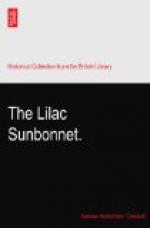The old lady had got so far when by the sound of retreating footsteps she judged that Winsome was out of hearing. Instantly she changed her tone.
“But, young man,” she said, shaking her finger at him as if she expected a contradiction, “mind you, there’s no a lass i’ twunty parishes like this lassie o’ mine. An’ dinna think that me an’ my guidman dinna ken brawly what’s bringin’ ye to Craig Ronald. Noo, it’s richt an’ better nor richt—for ye’re yer faither’s son, an’ we baith wuss ye weel. But mind you that there’s sorrow comin’ to us a’. Him an’ me here has had oor sorrows i’ the past, deep buried for mair nor twenty year.”
“I thank you with all my heart,” said Ralph, earnestly. “I need not tell you, after what I have said, that I would lay my life down as a very little thing to pleasure Winsome Charteris. I love her as I never thought that woman could be loved, and I am not the kind to change.”
“The faither o’ ye didna change, though his faither garred him mairry a Gilchrist-an’ a guid bit lass she was. But for a’ that he didna change. Na, weel do I ken that he didna change.”
“But,” continued Ralph, “I have no reason in the world to imagine that Winsome thinks a thought about me. On the contrary, I have some reason to fear that she dislikes my person; and I would not be troublesome to her—”
“Hoot toot! laddie, dinna let the Whig bluid mak’ a pulin’ bairn o’ ye. Surely ye dinna expect a lass o’ speerit to jump at the thocht o’ ye, or drap intil yer moo’ like a black-ripe cherry aff a tree i’ the orchard. Gae wa’ wi’ ye, man! what does a blithe young man o’ mettle want wi’ encouragement—encouragement, fie!”
“Perhaps you can tell me—” faltered Ralph. “I thought—”
“Na, na, I can tell ye naething; ye maun juist find oot for yersel’, as a young man should. Only this I wull say, it’s only a cauldrife Whigamore that wad tak’ ‘No’ for an answer. Mind ye that gin the forbears o’ the daddy o’ ye was on the wrang side o’ Bothwell Brig that day—an’ guid Westland bluid they spilt, nae doot, Whigs though they waur—there’s that in ye that rode doon the West Port wi’ Clavers, an’ cried:
‘Up wi’ the bonnets o’ bonny Dundee!’”
“I know,” said Ralph with some of the stiff sententiousness which he had not yet got rid of, “that I am not worthy of your granddaughter in any respect—”
“My certes, no,” said the sharp-witted dame, “for ye’re a man, an’ it’s a guid blessin’ that you men dinna get your deserts, or it wad be a puir lookoot for the next generation, young man. Gae wa’ wi’ ye, man; mind ye, I’ll no’ say a word in yer favour, but raither the ither way—whilk,” smiled Mistress Skirving in the deep still way that she sometimes had in the midst of her liveliness, “whilk will maybe do ye mair guid. But I’m speakin’ for my guid-man when I say that ye hae oor best guid-wull. We think that ye are a true man, as yer faither was, though sorely he was used by this hoose. It wad maybes be some amends,” she added, as if to herself.




